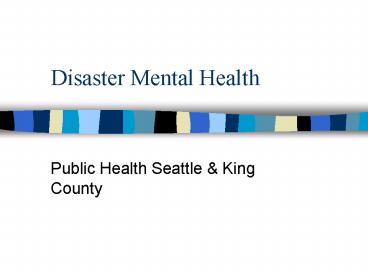Disaster Mental Health - PowerPoint PPT Presentation
1 / 21
Title: Disaster Mental Health
1
Disaster Mental Health
- Public Health Seattle King County
2
Key Concepts of Disaster Mental Health
- Disaster stress and grief reactions are normal
responses to an abnormal situation - Social support systems are crucial to recovery
after a disaster - Most people pull together and function during and
after a disaster but their effectiveness is
diminished
3
Does a Person Have to be Directly Affected by an
Event to Experience Stress Responses?
- No, people can experience stress responses
- Witnessing a traumatic event (eye witness or
television) - Learning of a family or friends traumatic
experience
4
Factors Influencing Response to Traumatic Events
- Degree and nature of exposure
- Developed coping mechanisms or strategies
- Available resources and support
- Ability to understand what has happened
- Personal meaning of the event
- Developmental level
5
Populations at Risk for Psychiatric Problems
Following a Traumatic Stress
- Those exposed to the dead and injured
- The elderly or the very young
- People with a history of previous exposure to
traumatic events
6
Populations at Risk for Psychiatric Problems
Following a Traumatic Stress Continued
- People with other major life stressors
- People with poor support systems
- Those with chronic medical or psychological
disorders
7
What are Normal Responses to Traumatic Events?
8
Normal Reactions
- Profound sadness, grief and anger
- Feelings of depression and anxiousness
- Loss of interest in usual activities
- Numbness or lack of feeling
- Edginess, irritability
- Trouble sleeping or concentrating
9
Behavioral Changes
- Change in appetite (more or less than usual)
- Increased substance use
- Interpersonal conflict
10
Physical Signs and Symptoms
- Fatigue
- Muscle spasms or aches
- Nausea, diarrhea, stomach aches
- Headaches
- High blood pressure
- Shortness of breath, tightening in chest or
throat - Sexual problems
11
Signs You or Your Co-Worker May Need Assistance
Dealing with Stress
- You feel overwhelmed and unable to cope
- Responses interfere significantly with your
ability to function in daily activities - Symptoms worsen over a month or more
12
Signs You or Your Co-Worker May Need Assistance
Dealing with Stress Continued
- You are experiencing several signs/symptoms at
once or for days at a time - Abusive behavior towards self, (including
drinking too much or thoughts of suicide), or
others - Stress is making you physically sick
13
Individual Ways of Managing Stress
- Exercise
- Eat well and avoid junk food, caffeine or alcohol
- Get adequate sleep and rest
14
Individual Ways of Managing Stress Continued
- Meditate
- Recharge your batteries by taking a bath,
listening to music, reading etc. - Take time out for hobbies and other enjoyable
activities - Maintain contact with social support system
15
Individual Ways of Managing Stress Continued
- Talk about your experiences and feelings with
someone you trust - If television or other news sources make you feel
worse then dont watch or read them
16
Educate yourself on stress responses, ways to
cope and when and where to get help
- Recognize early warning signs
- Accept you may need help in assessing your level
of stress - Use a buddy system where you monitor each other
for stress
17
Organizational Ways to Lessen Stress During an
Event
- Clear chain of command
- Available supervisors
- Shifts of no more than 12 hours
- Regular briefing on whats happening
- Clear purpose and goals
- Define roles by function
18
Develop a Management Plan for Stress
- Frequently assess workers functioning
- Encourage breaks
- Educate about signs of stress and coping
strategies - Facilitate access to individual and group
counseling
19
Available Resources for Public Health Staff
- Employee Assistance Program
- http//www.metrokc.gov/ohrm/OtherBenefits/mle.htm
20
Community Resources
- 24-hour Crisis Line
- (206) 461-3222, 1-866-4CRISIS
- Community Information Line
- (M-F 8am-6pm) (206) 461-3200, 1-800-621-INFO
- Seattle Chapter of American Red Cross
- (206) 323-2345 , Web site http//www.seattleredcr
oss.org/ - Local churches
21
Web Resources
- http//www.workplacementalhealth.org/resources.htm
- http//www.nimh.nih.gov/

